Business Professional Development: Self-Awareness and Career Goals
VerifiedAdded on 2022/10/19
|13
|3810
|15
Report
AI Summary
This report presents a comprehensive self-awareness analysis conducted by a student seeking an internship in the hospitality sector. It delves into various aspects of self-awareness, including personality traits like listening skills, customer orientation, and stress tolerance, as well as values and motivators that influence employee performance. The report explores emotional intelligence using Goleman's and Bar-On's models, highlighting self-management, social awareness, and relationship management. Leadership qualities, such as adaptability, team orientation, and entrepreneurial spirit, are also examined. Furthermore, the report touches upon the impact of power and politics on professional careers and concludes with a discussion of decision-making and planning processes. The student identifies strengths and weaknesses, demonstrating an understanding of how these factors contribute to professional development and career success.

Business professional development
Paraphrase This Document
Need a fresh take? Get an instant paraphrase of this document with our AI Paraphraser
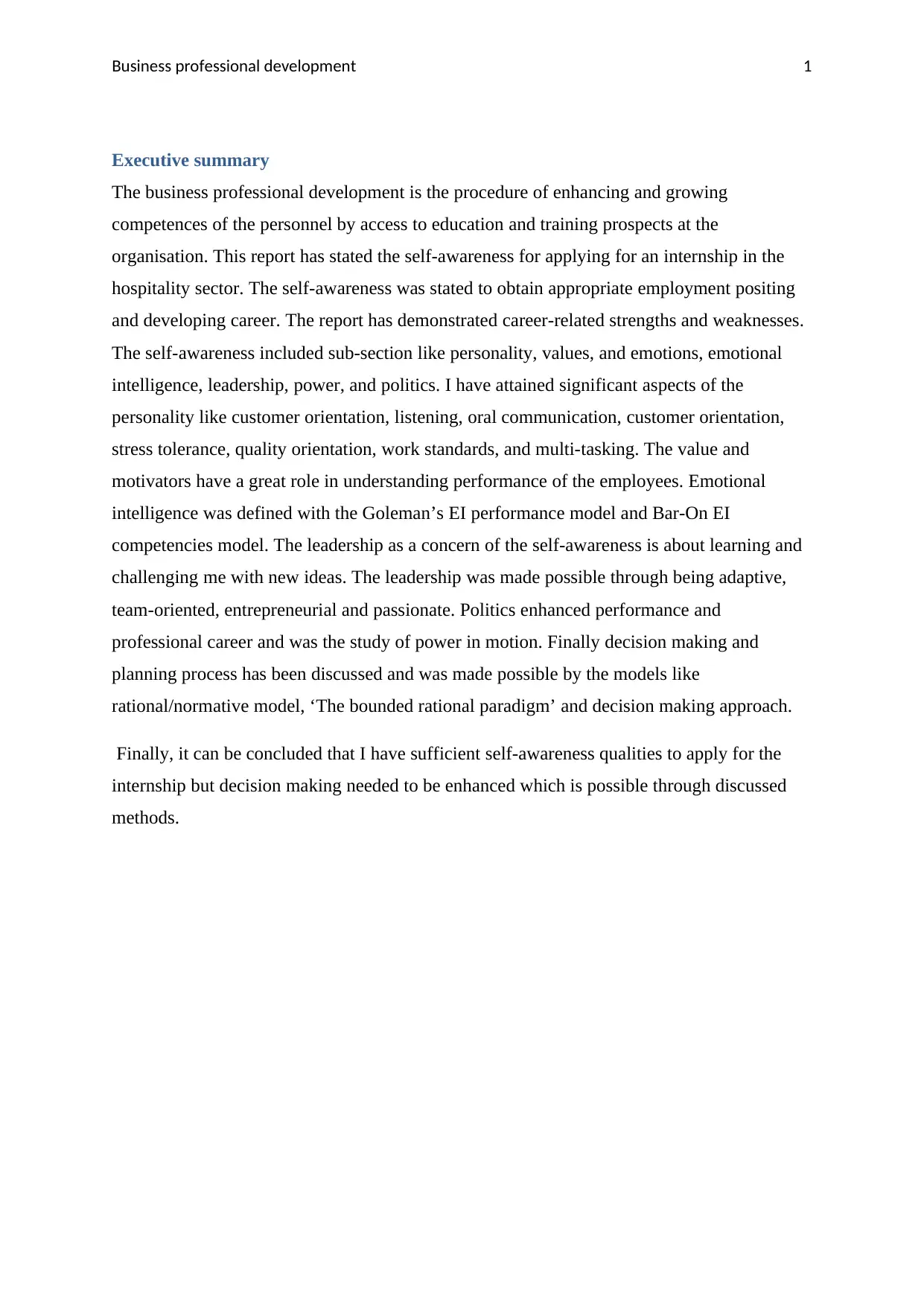
Business professional development 1
Executive summary
The business professional development is the procedure of enhancing and growing
competences of the personnel by access to education and training prospects at the
organisation. This report has stated the self-awareness for applying for an internship in the
hospitality sector. The self-awareness was stated to obtain appropriate employment positing
and developing career. The report has demonstrated career-related strengths and weaknesses.
The self-awareness included sub-section like personality, values, and emotions, emotional
intelligence, leadership, power, and politics. I have attained significant aspects of the
personality like customer orientation, listening, oral communication, customer orientation,
stress tolerance, quality orientation, work standards, and multi-tasking. The value and
motivators have a great role in understanding performance of the employees. Emotional
intelligence was defined with the Goleman’s EI performance model and Bar-On EI
competencies model. The leadership as a concern of the self-awareness is about learning and
challenging me with new ideas. The leadership was made possible through being adaptive,
team-oriented, entrepreneurial and passionate. Politics enhanced performance and
professional career and was the study of power in motion. Finally decision making and
planning process has been discussed and was made possible by the models like
rational/normative model, ‘The bounded rational paradigm’ and decision making approach.
Finally, it can be concluded that I have sufficient self-awareness qualities to apply for the
internship but decision making needed to be enhanced which is possible through discussed
methods.
Executive summary
The business professional development is the procedure of enhancing and growing
competences of the personnel by access to education and training prospects at the
organisation. This report has stated the self-awareness for applying for an internship in the
hospitality sector. The self-awareness was stated to obtain appropriate employment positing
and developing career. The report has demonstrated career-related strengths and weaknesses.
The self-awareness included sub-section like personality, values, and emotions, emotional
intelligence, leadership, power, and politics. I have attained significant aspects of the
personality like customer orientation, listening, oral communication, customer orientation,
stress tolerance, quality orientation, work standards, and multi-tasking. The value and
motivators have a great role in understanding performance of the employees. Emotional
intelligence was defined with the Goleman’s EI performance model and Bar-On EI
competencies model. The leadership as a concern of the self-awareness is about learning and
challenging me with new ideas. The leadership was made possible through being adaptive,
team-oriented, entrepreneurial and passionate. Politics enhanced performance and
professional career and was the study of power in motion. Finally decision making and
planning process has been discussed and was made possible by the models like
rational/normative model, ‘The bounded rational paradigm’ and decision making approach.
Finally, it can be concluded that I have sufficient self-awareness qualities to apply for the
internship but decision making needed to be enhanced which is possible through discussed
methods.
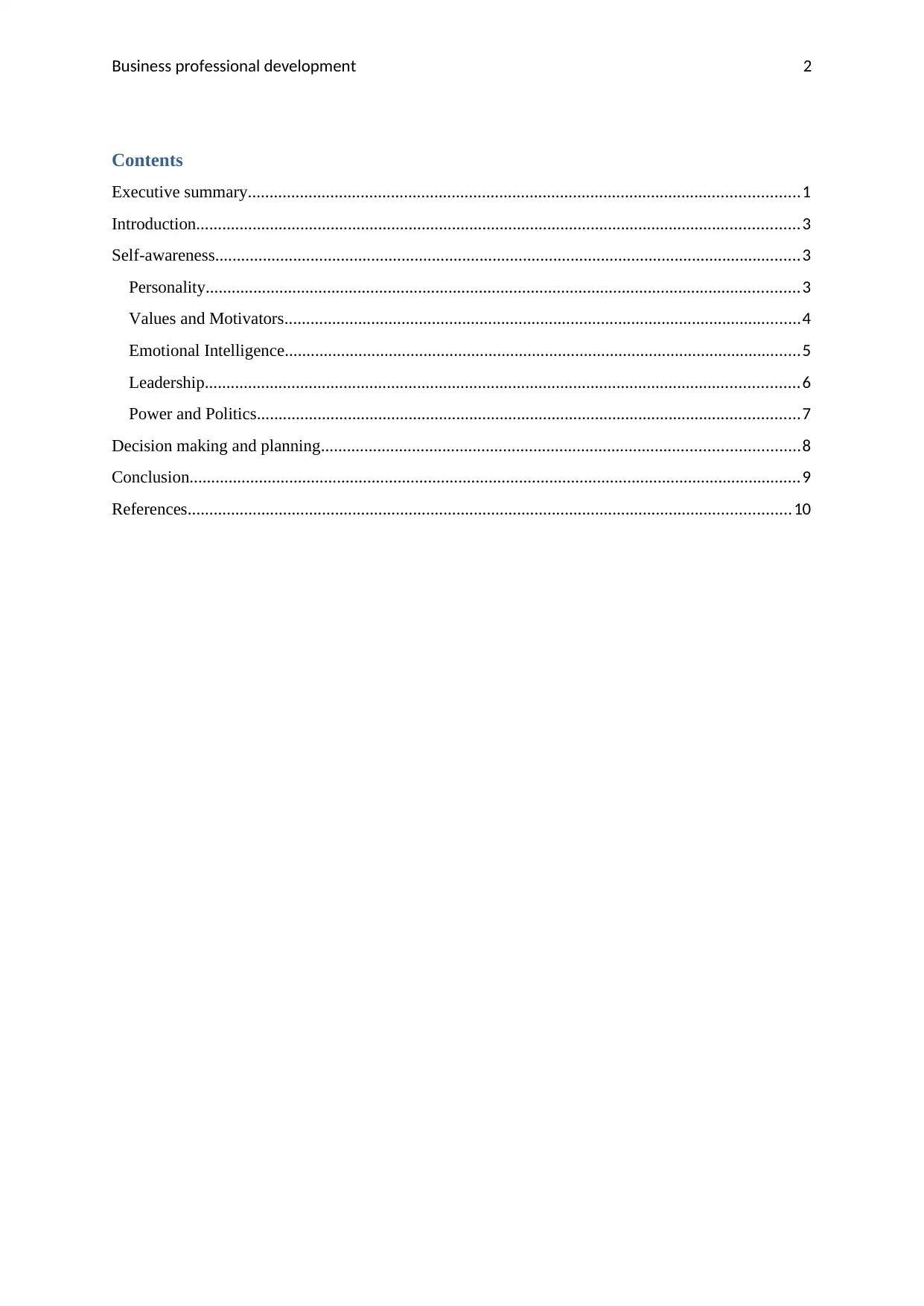
Business professional development 2
Contents
Executive summary...............................................................................................................................1
Introduction...........................................................................................................................................3
Self-awareness.......................................................................................................................................3
Personality.........................................................................................................................................3
Values and Motivators.......................................................................................................................4
Emotional Intelligence.......................................................................................................................5
Leadership.........................................................................................................................................6
Power and Politics.............................................................................................................................7
Decision making and planning..............................................................................................................8
Conclusion.............................................................................................................................................9
References...........................................................................................................................................10
Contents
Executive summary...............................................................................................................................1
Introduction...........................................................................................................................................3
Self-awareness.......................................................................................................................................3
Personality.........................................................................................................................................3
Values and Motivators.......................................................................................................................4
Emotional Intelligence.......................................................................................................................5
Leadership.........................................................................................................................................6
Power and Politics.............................................................................................................................7
Decision making and planning..............................................................................................................8
Conclusion.............................................................................................................................................9
References...........................................................................................................................................10
⊘ This is a preview!⊘
Do you want full access?
Subscribe today to unlock all pages.

Trusted by 1+ million students worldwide
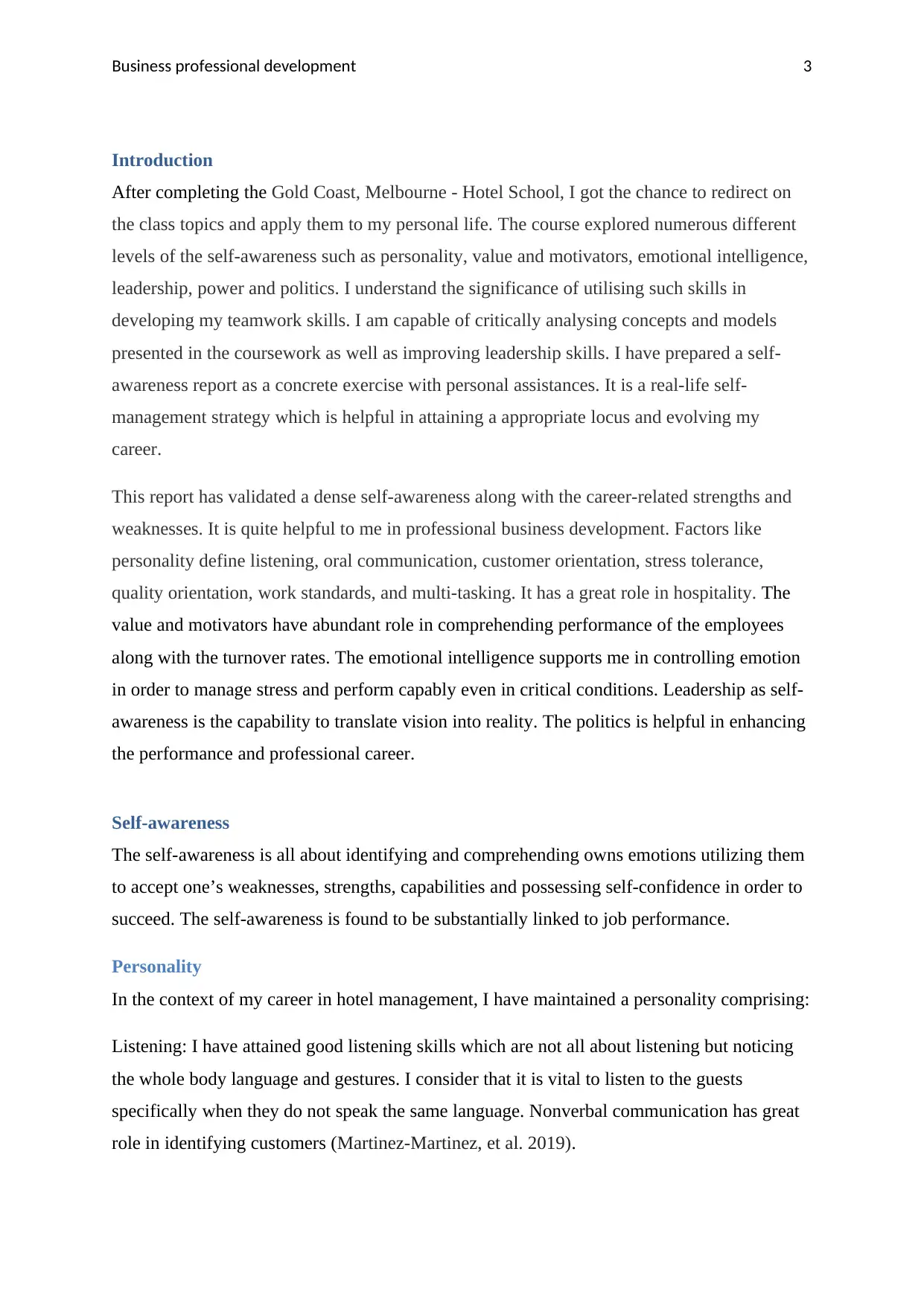
Business professional development 3
Introduction
After completing the Gold Coast, Melbourne - Hotel School, I got the chance to redirect on
the class topics and apply them to my personal life. The course explored numerous different
levels of the self-awareness such as personality, value and motivators, emotional intelligence,
leadership, power and politics. I understand the significance of utilising such skills in
developing my teamwork skills. I am capable of critically analysing concepts and models
presented in the coursework as well as improving leadership skills. I have prepared a self-
awareness report as a concrete exercise with personal assistances. It is a real-life self-
management strategy which is helpful in attaining a appropriate locus and evolving my
career.
This report has validated a dense self-awareness along with the career-related strengths and
weaknesses. It is quite helpful to me in professional business development. Factors like
personality define listening, oral communication, customer orientation, stress tolerance,
quality orientation, work standards, and multi-tasking. It has a great role in hospitality. The
value and motivators have abundant role in comprehending performance of the employees
along with the turnover rates. The emotional intelligence supports me in controlling emotion
in order to manage stress and perform capably even in critical conditions. Leadership as self-
awareness is the capability to translate vision into reality. The politics is helpful in enhancing
the performance and professional career.
Self-awareness
The self-awareness is all about identifying and comprehending owns emotions utilizing them
to accept one’s weaknesses, strengths, capabilities and possessing self-confidence in order to
succeed. The self-awareness is found to be substantially linked to job performance.
Personality
In the context of my career in hotel management, I have maintained a personality comprising:
Listening: I have attained good listening skills which are not all about listening but noticing
the whole body language and gestures. I consider that it is vital to listen to the guests
specifically when they do not speak the same language. Nonverbal communication has great
role in identifying customers (Martinez-Martinez, et al. 2019).
Introduction
After completing the Gold Coast, Melbourne - Hotel School, I got the chance to redirect on
the class topics and apply them to my personal life. The course explored numerous different
levels of the self-awareness such as personality, value and motivators, emotional intelligence,
leadership, power and politics. I understand the significance of utilising such skills in
developing my teamwork skills. I am capable of critically analysing concepts and models
presented in the coursework as well as improving leadership skills. I have prepared a self-
awareness report as a concrete exercise with personal assistances. It is a real-life self-
management strategy which is helpful in attaining a appropriate locus and evolving my
career.
This report has validated a dense self-awareness along with the career-related strengths and
weaknesses. It is quite helpful to me in professional business development. Factors like
personality define listening, oral communication, customer orientation, stress tolerance,
quality orientation, work standards, and multi-tasking. It has a great role in hospitality. The
value and motivators have abundant role in comprehending performance of the employees
along with the turnover rates. The emotional intelligence supports me in controlling emotion
in order to manage stress and perform capably even in critical conditions. Leadership as self-
awareness is the capability to translate vision into reality. The politics is helpful in enhancing
the performance and professional career.
Self-awareness
The self-awareness is all about identifying and comprehending owns emotions utilizing them
to accept one’s weaknesses, strengths, capabilities and possessing self-confidence in order to
succeed. The self-awareness is found to be substantially linked to job performance.
Personality
In the context of my career in hotel management, I have maintained a personality comprising:
Listening: I have attained good listening skills which are not all about listening but noticing
the whole body language and gestures. I consider that it is vital to listen to the guests
specifically when they do not speak the same language. Nonverbal communication has great
role in identifying customers (Martinez-Martinez, et al. 2019).
Paraphrase This Document
Need a fresh take? Get an instant paraphrase of this document with our AI Paraphraser
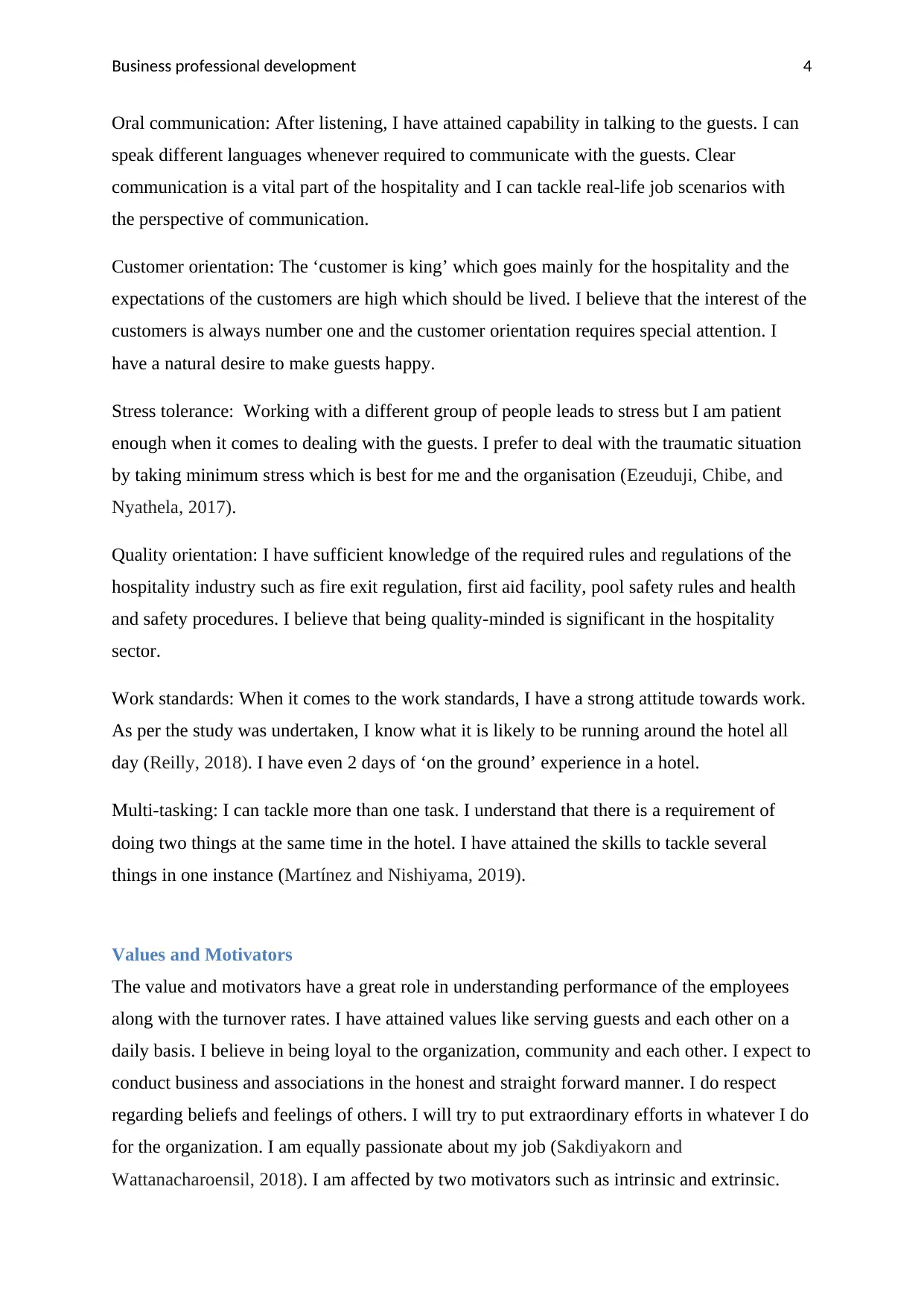
Business professional development 4
Oral communication: After listening, I have attained capability in talking to the guests. I can
speak different languages whenever required to communicate with the guests. Clear
communication is a vital part of the hospitality and I can tackle real-life job scenarios with
the perspective of communication.
Customer orientation: The ‘customer is king’ which goes mainly for the hospitality and the
expectations of the customers are high which should be lived. I believe that the interest of the
customers is always number one and the customer orientation requires special attention. I
have a natural desire to make guests happy.
Stress tolerance: Working with a different group of people leads to stress but I am patient
enough when it comes to dealing with the guests. I prefer to deal with the traumatic situation
by taking minimum stress which is best for me and the organisation (Ezeuduji, Chibe, and
Nyathela, 2017).
Quality orientation: I have sufficient knowledge of the required rules and regulations of the
hospitality industry such as fire exit regulation, first aid facility, pool safety rules and health
and safety procedures. I believe that being quality-minded is significant in the hospitality
sector.
Work standards: When it comes to the work standards, I have a strong attitude towards work.
As per the study was undertaken, I know what it is likely to be running around the hotel all
day (Reilly, 2018). I have even 2 days of ‘on the ground’ experience in a hotel.
Multi-tasking: I can tackle more than one task. I understand that there is a requirement of
doing two things at the same time in the hotel. I have attained the skills to tackle several
things in one instance (Martínez and Nishiyama, 2019).
Values and Motivators
The value and motivators have a great role in understanding performance of the employees
along with the turnover rates. I have attained values like serving guests and each other on a
daily basis. I believe in being loyal to the organization, community and each other. I expect to
conduct business and associations in the honest and straight forward manner. I do respect
regarding beliefs and feelings of others. I will try to put extraordinary efforts in whatever I do
for the organization. I am equally passionate about my job (Sakdiyakorn and
Wattanacharoensil, 2018). I am affected by two motivators such as intrinsic and extrinsic.
Oral communication: After listening, I have attained capability in talking to the guests. I can
speak different languages whenever required to communicate with the guests. Clear
communication is a vital part of the hospitality and I can tackle real-life job scenarios with
the perspective of communication.
Customer orientation: The ‘customer is king’ which goes mainly for the hospitality and the
expectations of the customers are high which should be lived. I believe that the interest of the
customers is always number one and the customer orientation requires special attention. I
have a natural desire to make guests happy.
Stress tolerance: Working with a different group of people leads to stress but I am patient
enough when it comes to dealing with the guests. I prefer to deal with the traumatic situation
by taking minimum stress which is best for me and the organisation (Ezeuduji, Chibe, and
Nyathela, 2017).
Quality orientation: I have sufficient knowledge of the required rules and regulations of the
hospitality industry such as fire exit regulation, first aid facility, pool safety rules and health
and safety procedures. I believe that being quality-minded is significant in the hospitality
sector.
Work standards: When it comes to the work standards, I have a strong attitude towards work.
As per the study was undertaken, I know what it is likely to be running around the hotel all
day (Reilly, 2018). I have even 2 days of ‘on the ground’ experience in a hotel.
Multi-tasking: I can tackle more than one task. I understand that there is a requirement of
doing two things at the same time in the hotel. I have attained the skills to tackle several
things in one instance (Martínez and Nishiyama, 2019).
Values and Motivators
The value and motivators have a great role in understanding performance of the employees
along with the turnover rates. I have attained values like serving guests and each other on a
daily basis. I believe in being loyal to the organization, community and each other. I expect to
conduct business and associations in the honest and straight forward manner. I do respect
regarding beliefs and feelings of others. I will try to put extraordinary efforts in whatever I do
for the organization. I am equally passionate about my job (Sakdiyakorn and
Wattanacharoensil, 2018). I am affected by two motivators such as intrinsic and extrinsic.
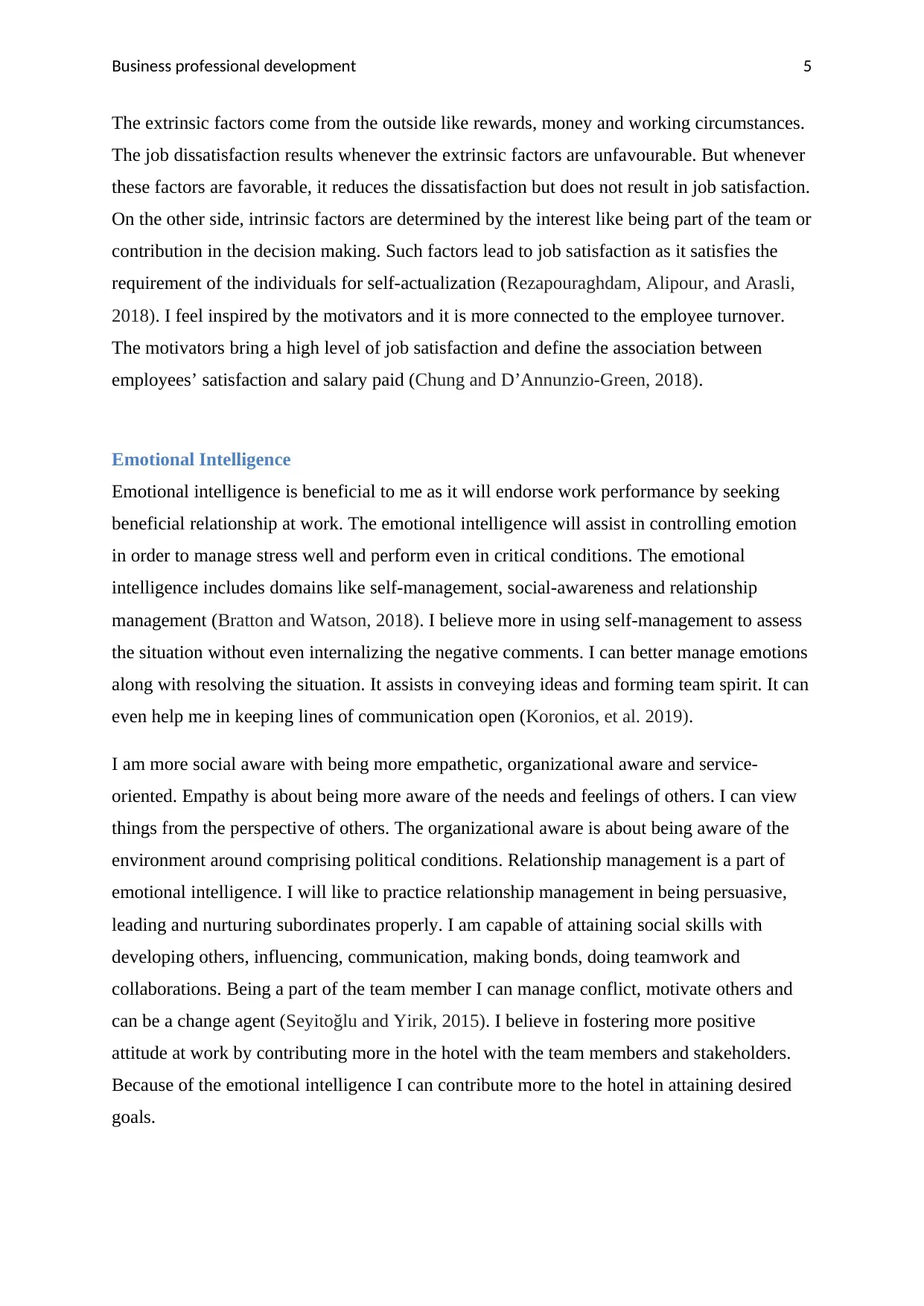
Business professional development 5
The extrinsic factors come from the outside like rewards, money and working circumstances.
The job dissatisfaction results whenever the extrinsic factors are unfavourable. But whenever
these factors are favorable, it reduces the dissatisfaction but does not result in job satisfaction.
On the other side, intrinsic factors are determined by the interest like being part of the team or
contribution in the decision making. Such factors lead to job satisfaction as it satisfies the
requirement of the individuals for self-actualization (Rezapouraghdam, Alipour, and Arasli,
2018). I feel inspired by the motivators and it is more connected to the employee turnover.
The motivators bring a high level of job satisfaction and define the association between
employees’ satisfaction and salary paid (Chung and D’Annunzio-Green, 2018).
Emotional Intelligence
Emotional intelligence is beneficial to me as it will endorse work performance by seeking
beneficial relationship at work. The emotional intelligence will assist in controlling emotion
in order to manage stress well and perform even in critical conditions. The emotional
intelligence includes domains like self-management, social-awareness and relationship
management (Bratton and Watson, 2018). I believe more in using self-management to assess
the situation without even internalizing the negative comments. I can better manage emotions
along with resolving the situation. It assists in conveying ideas and forming team spirit. It can
even help me in keeping lines of communication open (Koronios, et al. 2019).
I am more social aware with being more empathetic, organizational aware and service-
oriented. Empathy is about being more aware of the needs and feelings of others. I can view
things from the perspective of others. The organizational aware is about being aware of the
environment around comprising political conditions. Relationship management is a part of
emotional intelligence. I will like to practice relationship management in being persuasive,
leading and nurturing subordinates properly. I am capable of attaining social skills with
developing others, influencing, communication, making bonds, doing teamwork and
collaborations. Being a part of the team member I can manage conflict, motivate others and
can be a change agent (Seyitoğlu and Yirik, 2015). I believe in fostering more positive
attitude at work by contributing more in the hotel with the team members and stakeholders.
Because of the emotional intelligence I can contribute more to the hotel in attaining desired
goals.
The extrinsic factors come from the outside like rewards, money and working circumstances.
The job dissatisfaction results whenever the extrinsic factors are unfavourable. But whenever
these factors are favorable, it reduces the dissatisfaction but does not result in job satisfaction.
On the other side, intrinsic factors are determined by the interest like being part of the team or
contribution in the decision making. Such factors lead to job satisfaction as it satisfies the
requirement of the individuals for self-actualization (Rezapouraghdam, Alipour, and Arasli,
2018). I feel inspired by the motivators and it is more connected to the employee turnover.
The motivators bring a high level of job satisfaction and define the association between
employees’ satisfaction and salary paid (Chung and D’Annunzio-Green, 2018).
Emotional Intelligence
Emotional intelligence is beneficial to me as it will endorse work performance by seeking
beneficial relationship at work. The emotional intelligence will assist in controlling emotion
in order to manage stress well and perform even in critical conditions. The emotional
intelligence includes domains like self-management, social-awareness and relationship
management (Bratton and Watson, 2018). I believe more in using self-management to assess
the situation without even internalizing the negative comments. I can better manage emotions
along with resolving the situation. It assists in conveying ideas and forming team spirit. It can
even help me in keeping lines of communication open (Koronios, et al. 2019).
I am more social aware with being more empathetic, organizational aware and service-
oriented. Empathy is about being more aware of the needs and feelings of others. I can view
things from the perspective of others. The organizational aware is about being aware of the
environment around comprising political conditions. Relationship management is a part of
emotional intelligence. I will like to practice relationship management in being persuasive,
leading and nurturing subordinates properly. I am capable of attaining social skills with
developing others, influencing, communication, making bonds, doing teamwork and
collaborations. Being a part of the team member I can manage conflict, motivate others and
can be a change agent (Seyitoğlu and Yirik, 2015). I believe in fostering more positive
attitude at work by contributing more in the hotel with the team members and stakeholders.
Because of the emotional intelligence I can contribute more to the hotel in attaining desired
goals.
⊘ This is a preview!⊘
Do you want full access?
Subscribe today to unlock all pages.

Trusted by 1+ million students worldwide
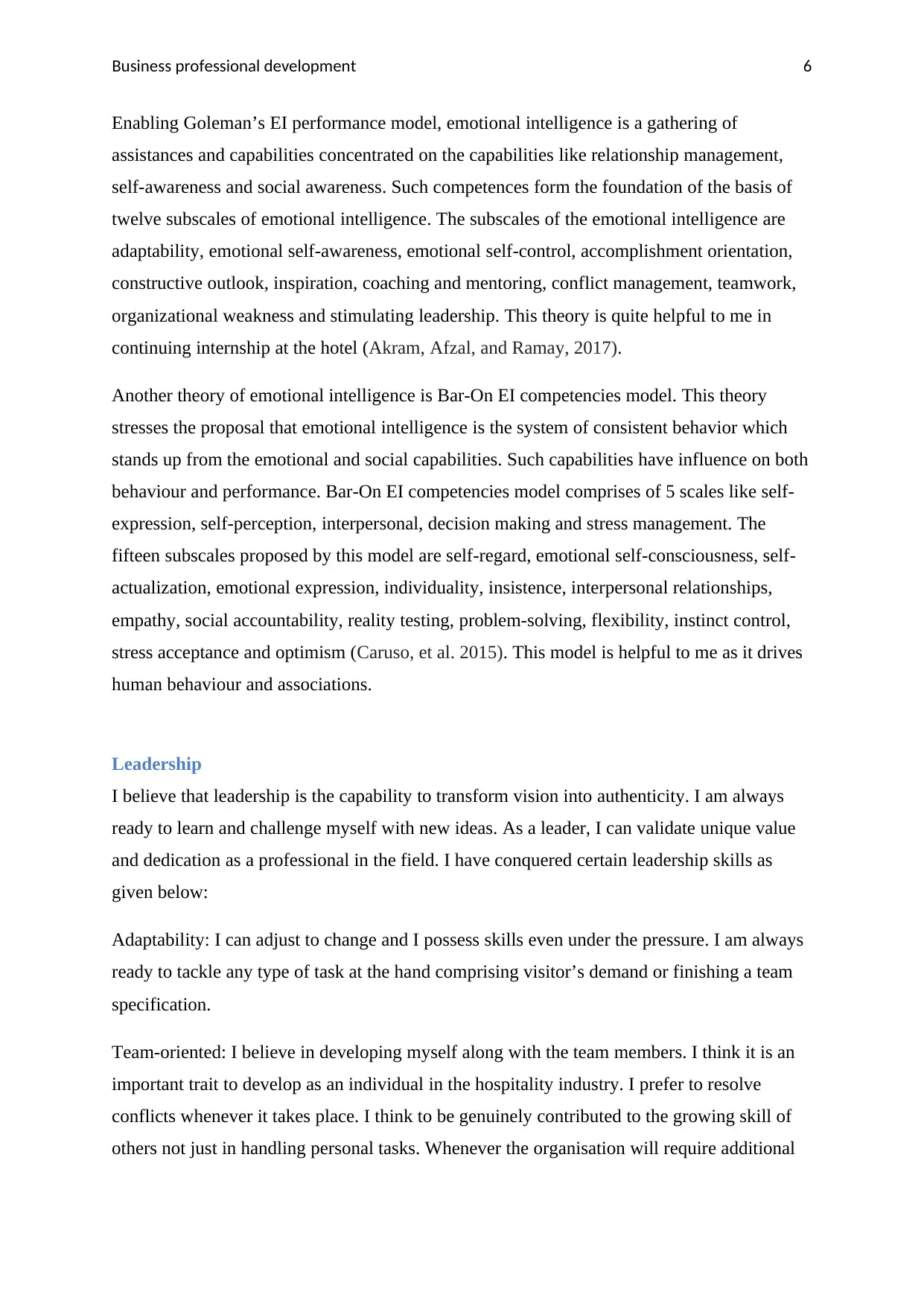
Business professional development 6
Enabling Goleman’s EI performance model, emotional intelligence is a gathering of
assistances and capabilities concentrated on the capabilities like relationship management,
self-awareness and social awareness. Such competences form the foundation of the basis of
twelve subscales of emotional intelligence. The subscales of the emotional intelligence are
adaptability, emotional self-awareness, emotional self-control, accomplishment orientation,
constructive outlook, inspiration, coaching and mentoring, conflict management, teamwork,
organizational weakness and stimulating leadership. This theory is quite helpful to me in
continuing internship at the hotel (Akram, Afzal, and Ramay, 2017).
Another theory of emotional intelligence is Bar-On EI competencies model. This theory
stresses the proposal that emotional intelligence is the system of consistent behavior which
stands up from the emotional and social capabilities. Such capabilities have influence on both
behaviour and performance. Bar-On EI competencies model comprises of 5 scales like self-
expression, self-perception, interpersonal, decision making and stress management. The
fifteen subscales proposed by this model are self-regard, emotional self-consciousness, self-
actualization, emotional expression, individuality, insistence, interpersonal relationships,
empathy, social accountability, reality testing, problem-solving, flexibility, instinct control,
stress acceptance and optimism (Caruso, et al. 2015). This model is helpful to me as it drives
human behaviour and associations.
Leadership
I believe that leadership is the capability to transform vision into authenticity. I am always
ready to learn and challenge myself with new ideas. As a leader, I can validate unique value
and dedication as a professional in the field. I have conquered certain leadership skills as
given below:
Adaptability: I can adjust to change and I possess skills even under the pressure. I am always
ready to tackle any type of task at the hand comprising visitor’s demand or finishing a team
specification.
Team-oriented: I believe in developing myself along with the team members. I think it is an
important trait to develop as an individual in the hospitality industry. I prefer to resolve
conflicts whenever it takes place. I think to be genuinely contributed to the growing skill of
others not just in handling personal tasks. Whenever the organisation will require additional
Enabling Goleman’s EI performance model, emotional intelligence is a gathering of
assistances and capabilities concentrated on the capabilities like relationship management,
self-awareness and social awareness. Such competences form the foundation of the basis of
twelve subscales of emotional intelligence. The subscales of the emotional intelligence are
adaptability, emotional self-awareness, emotional self-control, accomplishment orientation,
constructive outlook, inspiration, coaching and mentoring, conflict management, teamwork,
organizational weakness and stimulating leadership. This theory is quite helpful to me in
continuing internship at the hotel (Akram, Afzal, and Ramay, 2017).
Another theory of emotional intelligence is Bar-On EI competencies model. This theory
stresses the proposal that emotional intelligence is the system of consistent behavior which
stands up from the emotional and social capabilities. Such capabilities have influence on both
behaviour and performance. Bar-On EI competencies model comprises of 5 scales like self-
expression, self-perception, interpersonal, decision making and stress management. The
fifteen subscales proposed by this model are self-regard, emotional self-consciousness, self-
actualization, emotional expression, individuality, insistence, interpersonal relationships,
empathy, social accountability, reality testing, problem-solving, flexibility, instinct control,
stress acceptance and optimism (Caruso, et al. 2015). This model is helpful to me as it drives
human behaviour and associations.
Leadership
I believe that leadership is the capability to transform vision into authenticity. I am always
ready to learn and challenge myself with new ideas. As a leader, I can validate unique value
and dedication as a professional in the field. I have conquered certain leadership skills as
given below:
Adaptability: I can adjust to change and I possess skills even under the pressure. I am always
ready to tackle any type of task at the hand comprising visitor’s demand or finishing a team
specification.
Team-oriented: I believe in developing myself along with the team members. I think it is an
important trait to develop as an individual in the hospitality industry. I prefer to resolve
conflicts whenever it takes place. I think to be genuinely contributed to the growing skill of
others not just in handling personal tasks. Whenever the organisation will require additional
Paraphrase This Document
Need a fresh take? Get an instant paraphrase of this document with our AI Paraphraser
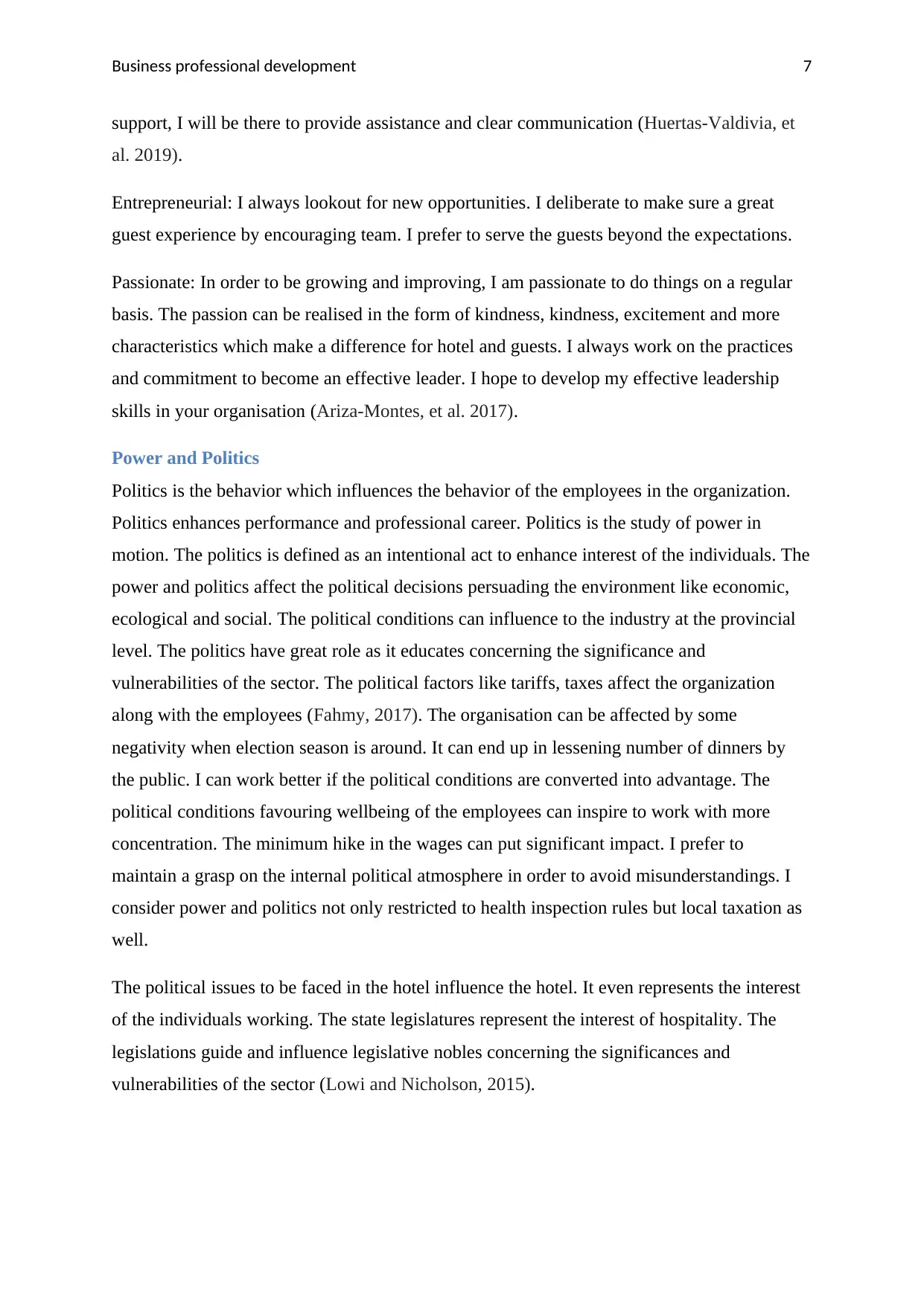
Business professional development 7
support, I will be there to provide assistance and clear communication (Huertas-Valdivia, et
al. 2019).
Entrepreneurial: I always lookout for new opportunities. I deliberate to make sure a great
guest experience by encouraging team. I prefer to serve the guests beyond the expectations.
Passionate: In order to be growing and improving, I am passionate to do things on a regular
basis. The passion can be realised in the form of kindness, kindness, excitement and more
characteristics which make a difference for hotel and guests. I always work on the practices
and commitment to become an effective leader. I hope to develop my effective leadership
skills in your organisation (Ariza-Montes, et al. 2017).
Power and Politics
Politics is the behavior which influences the behavior of the employees in the organization.
Politics enhances performance and professional career. Politics is the study of power in
motion. The politics is defined as an intentional act to enhance interest of the individuals. The
power and politics affect the political decisions persuading the environment like economic,
ecological and social. The political conditions can influence to the industry at the provincial
level. The politics have great role as it educates concerning the significance and
vulnerabilities of the sector. The political factors like tariffs, taxes affect the organization
along with the employees (Fahmy, 2017). The organisation can be affected by some
negativity when election season is around. It can end up in lessening number of dinners by
the public. I can work better if the political conditions are converted into advantage. The
political conditions favouring wellbeing of the employees can inspire to work with more
concentration. The minimum hike in the wages can put significant impact. I prefer to
maintain a grasp on the internal political atmosphere in order to avoid misunderstandings. I
consider power and politics not only restricted to health inspection rules but local taxation as
well.
The political issues to be faced in the hotel influence the hotel. It even represents the interest
of the individuals working. The state legislatures represent the interest of hospitality. The
legislations guide and influence legislative nobles concerning the significances and
vulnerabilities of the sector (Lowi and Nicholson, 2015).
support, I will be there to provide assistance and clear communication (Huertas-Valdivia, et
al. 2019).
Entrepreneurial: I always lookout for new opportunities. I deliberate to make sure a great
guest experience by encouraging team. I prefer to serve the guests beyond the expectations.
Passionate: In order to be growing and improving, I am passionate to do things on a regular
basis. The passion can be realised in the form of kindness, kindness, excitement and more
characteristics which make a difference for hotel and guests. I always work on the practices
and commitment to become an effective leader. I hope to develop my effective leadership
skills in your organisation (Ariza-Montes, et al. 2017).
Power and Politics
Politics is the behavior which influences the behavior of the employees in the organization.
Politics enhances performance and professional career. Politics is the study of power in
motion. The politics is defined as an intentional act to enhance interest of the individuals. The
power and politics affect the political decisions persuading the environment like economic,
ecological and social. The political conditions can influence to the industry at the provincial
level. The politics have great role as it educates concerning the significance and
vulnerabilities of the sector. The political factors like tariffs, taxes affect the organization
along with the employees (Fahmy, 2017). The organisation can be affected by some
negativity when election season is around. It can end up in lessening number of dinners by
the public. I can work better if the political conditions are converted into advantage. The
political conditions favouring wellbeing of the employees can inspire to work with more
concentration. The minimum hike in the wages can put significant impact. I prefer to
maintain a grasp on the internal political atmosphere in order to avoid misunderstandings. I
consider power and politics not only restricted to health inspection rules but local taxation as
well.
The political issues to be faced in the hotel influence the hotel. It even represents the interest
of the individuals working. The state legislatures represent the interest of hospitality. The
legislations guide and influence legislative nobles concerning the significances and
vulnerabilities of the sector (Lowi and Nicholson, 2015).
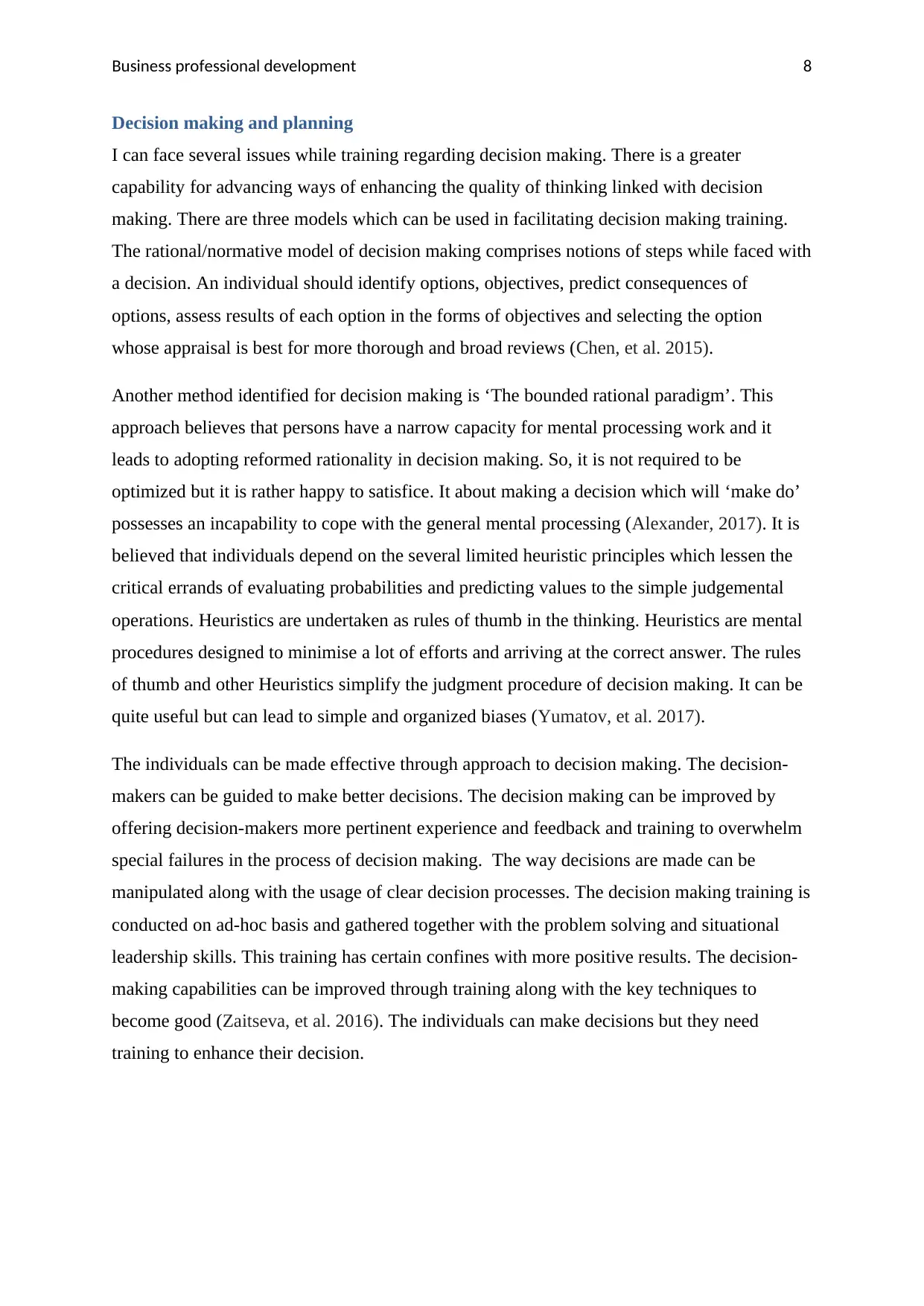
Business professional development 8
Decision making and planning
I can face several issues while training regarding decision making. There is a greater
capability for advancing ways of enhancing the quality of thinking linked with decision
making. There are three models which can be used in facilitating decision making training.
The rational/normative model of decision making comprises notions of steps while faced with
a decision. An individual should identify options, objectives, predict consequences of
options, assess results of each option in the forms of objectives and selecting the option
whose appraisal is best for more thorough and broad reviews (Chen, et al. 2015).
Another method identified for decision making is ‘The bounded rational paradigm’. This
approach believes that persons have a narrow capacity for mental processing work and it
leads to adopting reformed rationality in decision making. So, it is not required to be
optimized but it is rather happy to satisfice. It about making a decision which will ‘make do’
possesses an incapability to cope with the general mental processing (Alexander, 2017). It is
believed that individuals depend on the several limited heuristic principles which lessen the
critical errands of evaluating probabilities and predicting values to the simple judgemental
operations. Heuristics are undertaken as rules of thumb in the thinking. Heuristics are mental
procedures designed to minimise a lot of efforts and arriving at the correct answer. The rules
of thumb and other Heuristics simplify the judgment procedure of decision making. It can be
quite useful but can lead to simple and organized biases (Yumatov, et al. 2017).
The individuals can be made effective through approach to decision making. The decision-
makers can be guided to make better decisions. The decision making can be improved by
offering decision-makers more pertinent experience and feedback and training to overwhelm
special failures in the process of decision making. The way decisions are made can be
manipulated along with the usage of clear decision processes. The decision making training is
conducted on ad-hoc basis and gathered together with the problem solving and situational
leadership skills. This training has certain confines with more positive results. The decision-
making capabilities can be improved through training along with the key techniques to
become good (Zaitseva, et al. 2016). The individuals can make decisions but they need
training to enhance their decision.
Decision making and planning
I can face several issues while training regarding decision making. There is a greater
capability for advancing ways of enhancing the quality of thinking linked with decision
making. There are three models which can be used in facilitating decision making training.
The rational/normative model of decision making comprises notions of steps while faced with
a decision. An individual should identify options, objectives, predict consequences of
options, assess results of each option in the forms of objectives and selecting the option
whose appraisal is best for more thorough and broad reviews (Chen, et al. 2015).
Another method identified for decision making is ‘The bounded rational paradigm’. This
approach believes that persons have a narrow capacity for mental processing work and it
leads to adopting reformed rationality in decision making. So, it is not required to be
optimized but it is rather happy to satisfice. It about making a decision which will ‘make do’
possesses an incapability to cope with the general mental processing (Alexander, 2017). It is
believed that individuals depend on the several limited heuristic principles which lessen the
critical errands of evaluating probabilities and predicting values to the simple judgemental
operations. Heuristics are undertaken as rules of thumb in the thinking. Heuristics are mental
procedures designed to minimise a lot of efforts and arriving at the correct answer. The rules
of thumb and other Heuristics simplify the judgment procedure of decision making. It can be
quite useful but can lead to simple and organized biases (Yumatov, et al. 2017).
The individuals can be made effective through approach to decision making. The decision-
makers can be guided to make better decisions. The decision making can be improved by
offering decision-makers more pertinent experience and feedback and training to overwhelm
special failures in the process of decision making. The way decisions are made can be
manipulated along with the usage of clear decision processes. The decision making training is
conducted on ad-hoc basis and gathered together with the problem solving and situational
leadership skills. This training has certain confines with more positive results. The decision-
making capabilities can be improved through training along with the key techniques to
become good (Zaitseva, et al. 2016). The individuals can make decisions but they need
training to enhance their decision.
⊘ This is a preview!⊘
Do you want full access?
Subscribe today to unlock all pages.

Trusted by 1+ million students worldwide
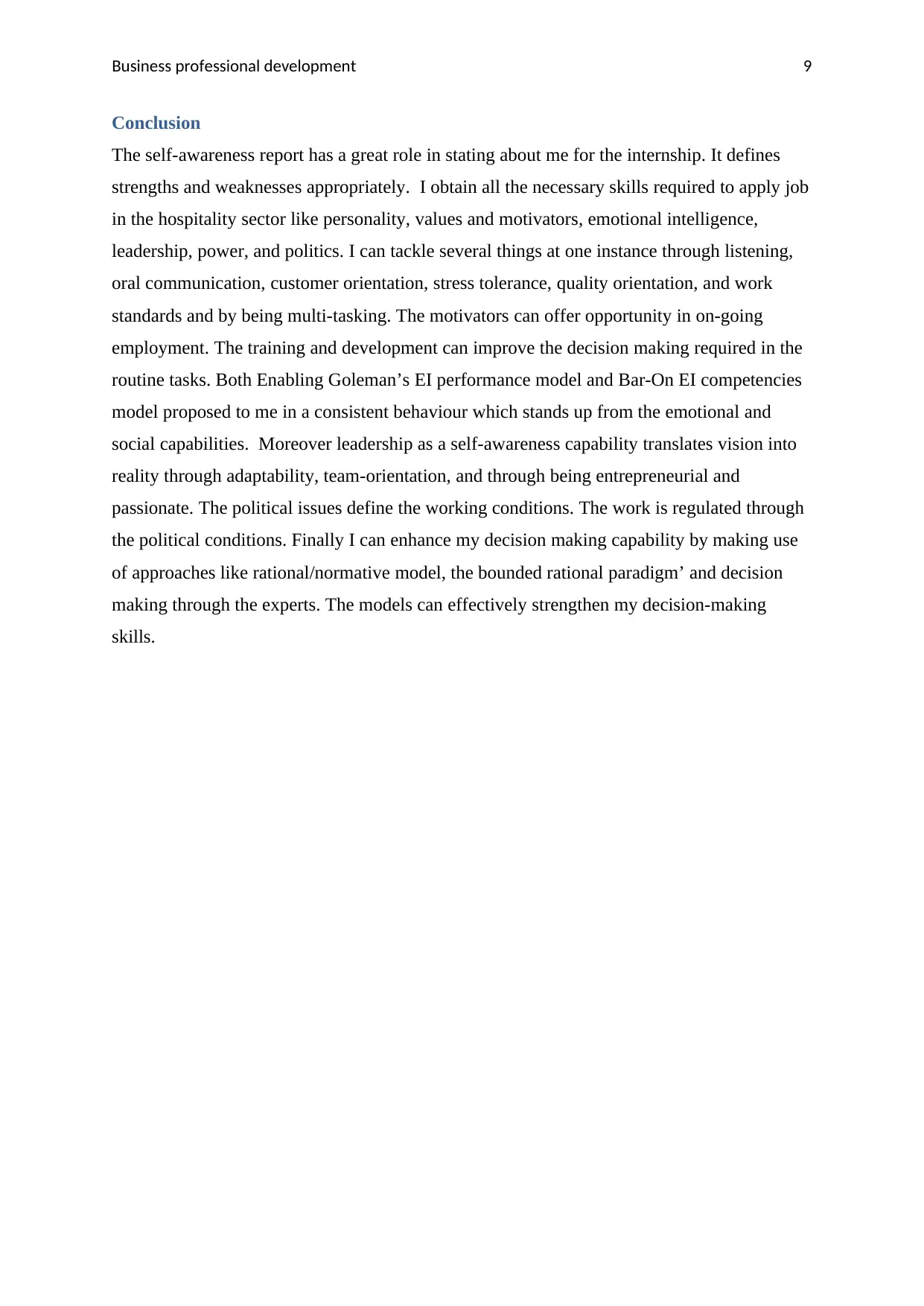
Business professional development 9
Conclusion
The self-awareness report has a great role in stating about me for the internship. It defines
strengths and weaknesses appropriately. I obtain all the necessary skills required to apply job
in the hospitality sector like personality, values and motivators, emotional intelligence,
leadership, power, and politics. I can tackle several things at one instance through listening,
oral communication, customer orientation, stress tolerance, quality orientation, and work
standards and by being multi-tasking. The motivators can offer opportunity in on-going
employment. The training and development can improve the decision making required in the
routine tasks. Both Enabling Goleman’s EI performance model and Bar-On EI competencies
model proposed to me in a consistent behaviour which stands up from the emotional and
social capabilities. Moreover leadership as a self-awareness capability translates vision into
reality through adaptability, team-orientation, and through being entrepreneurial and
passionate. The political issues define the working conditions. The work is regulated through
the political conditions. Finally I can enhance my decision making capability by making use
of approaches like rational/normative model, the bounded rational paradigm’ and decision
making through the experts. The models can effectively strengthen my decision-making
skills.
Conclusion
The self-awareness report has a great role in stating about me for the internship. It defines
strengths and weaknesses appropriately. I obtain all the necessary skills required to apply job
in the hospitality sector like personality, values and motivators, emotional intelligence,
leadership, power, and politics. I can tackle several things at one instance through listening,
oral communication, customer orientation, stress tolerance, quality orientation, and work
standards and by being multi-tasking. The motivators can offer opportunity in on-going
employment. The training and development can improve the decision making required in the
routine tasks. Both Enabling Goleman’s EI performance model and Bar-On EI competencies
model proposed to me in a consistent behaviour which stands up from the emotional and
social capabilities. Moreover leadership as a self-awareness capability translates vision into
reality through adaptability, team-orientation, and through being entrepreneurial and
passionate. The political issues define the working conditions. The work is regulated through
the political conditions. Finally I can enhance my decision making capability by making use
of approaches like rational/normative model, the bounded rational paradigm’ and decision
making through the experts. The models can effectively strengthen my decision-making
skills.
Paraphrase This Document
Need a fresh take? Get an instant paraphrase of this document with our AI Paraphraser
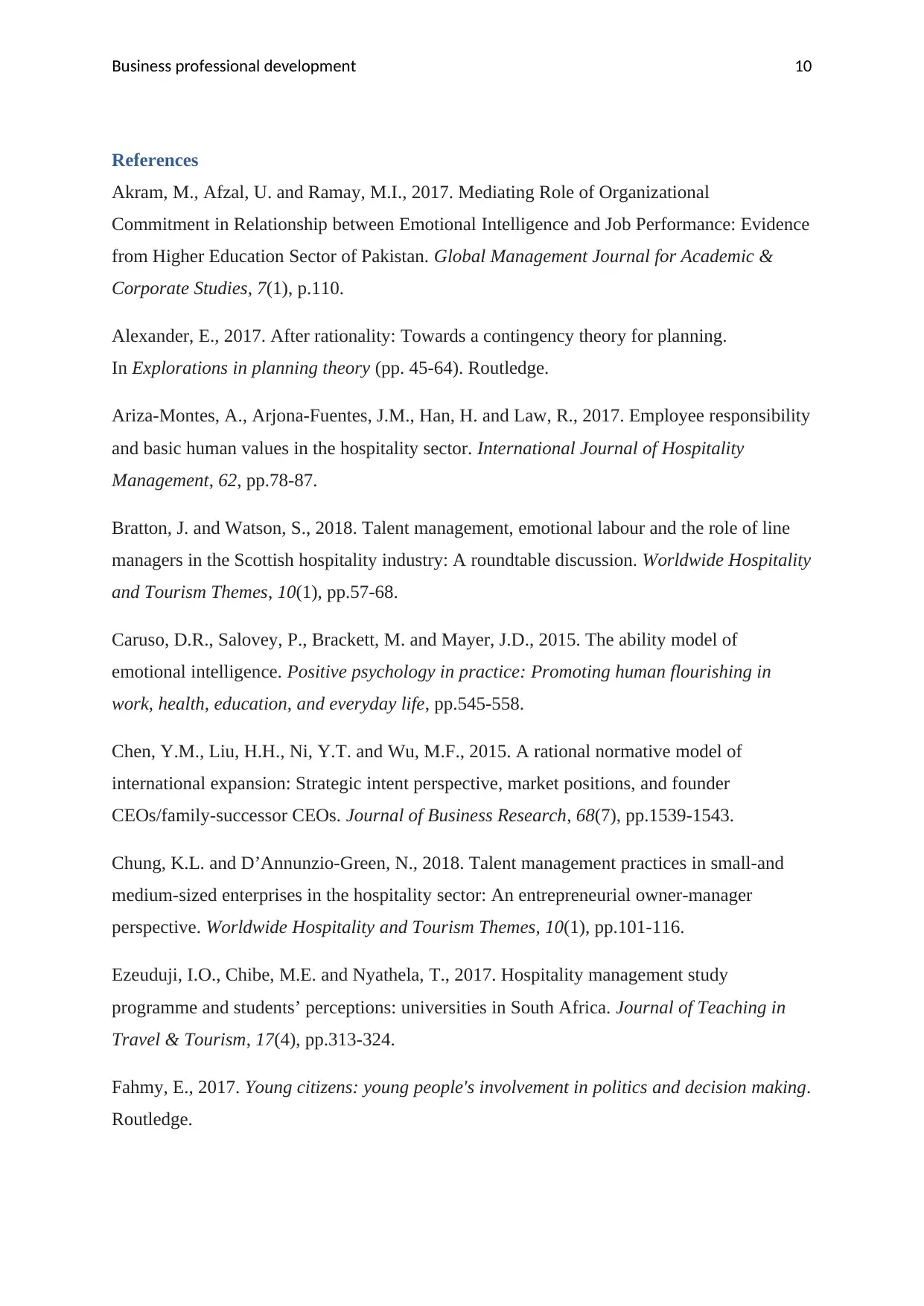
Business professional development 10
References
Akram, M., Afzal, U. and Ramay, M.I., 2017. Mediating Role of Organizational
Commitment in Relationship between Emotional Intelligence and Job Performance: Evidence
from Higher Education Sector of Pakistan. Global Management Journal for Academic &
Corporate Studies, 7(1), p.110.
Alexander, E., 2017. After rationality: Towards a contingency theory for planning.
In Explorations in planning theory (pp. 45-64). Routledge.
Ariza-Montes, A., Arjona-Fuentes, J.M., Han, H. and Law, R., 2017. Employee responsibility
and basic human values in the hospitality sector. International Journal of Hospitality
Management, 62, pp.78-87.
Bratton, J. and Watson, S., 2018. Talent management, emotional labour and the role of line
managers in the Scottish hospitality industry: A roundtable discussion. Worldwide Hospitality
and Tourism Themes, 10(1), pp.57-68.
Caruso, D.R., Salovey, P., Brackett, M. and Mayer, J.D., 2015. The ability model of
emotional intelligence. Positive psychology in practice: Promoting human flourishing in
work, health, education, and everyday life, pp.545-558.
Chen, Y.M., Liu, H.H., Ni, Y.T. and Wu, M.F., 2015. A rational normative model of
international expansion: Strategic intent perspective, market positions, and founder
CEOs/family-successor CEOs. Journal of Business Research, 68(7), pp.1539-1543.
Chung, K.L. and D’Annunzio-Green, N., 2018. Talent management practices in small-and
medium-sized enterprises in the hospitality sector: An entrepreneurial owner-manager
perspective. Worldwide Hospitality and Tourism Themes, 10(1), pp.101-116.
Ezeuduji, I.O., Chibe, M.E. and Nyathela, T., 2017. Hospitality management study
programme and students’ perceptions: universities in South Africa. Journal of Teaching in
Travel & Tourism, 17(4), pp.313-324.
Fahmy, E., 2017. Young citizens: young people's involvement in politics and decision making.
Routledge.
References
Akram, M., Afzal, U. and Ramay, M.I., 2017. Mediating Role of Organizational
Commitment in Relationship between Emotional Intelligence and Job Performance: Evidence
from Higher Education Sector of Pakistan. Global Management Journal for Academic &
Corporate Studies, 7(1), p.110.
Alexander, E., 2017. After rationality: Towards a contingency theory for planning.
In Explorations in planning theory (pp. 45-64). Routledge.
Ariza-Montes, A., Arjona-Fuentes, J.M., Han, H. and Law, R., 2017. Employee responsibility
and basic human values in the hospitality sector. International Journal of Hospitality
Management, 62, pp.78-87.
Bratton, J. and Watson, S., 2018. Talent management, emotional labour and the role of line
managers in the Scottish hospitality industry: A roundtable discussion. Worldwide Hospitality
and Tourism Themes, 10(1), pp.57-68.
Caruso, D.R., Salovey, P., Brackett, M. and Mayer, J.D., 2015. The ability model of
emotional intelligence. Positive psychology in practice: Promoting human flourishing in
work, health, education, and everyday life, pp.545-558.
Chen, Y.M., Liu, H.H., Ni, Y.T. and Wu, M.F., 2015. A rational normative model of
international expansion: Strategic intent perspective, market positions, and founder
CEOs/family-successor CEOs. Journal of Business Research, 68(7), pp.1539-1543.
Chung, K.L. and D’Annunzio-Green, N., 2018. Talent management practices in small-and
medium-sized enterprises in the hospitality sector: An entrepreneurial owner-manager
perspective. Worldwide Hospitality and Tourism Themes, 10(1), pp.101-116.
Ezeuduji, I.O., Chibe, M.E. and Nyathela, T., 2017. Hospitality management study
programme and students’ perceptions: universities in South Africa. Journal of Teaching in
Travel & Tourism, 17(4), pp.313-324.
Fahmy, E., 2017. Young citizens: young people's involvement in politics and decision making.
Routledge.
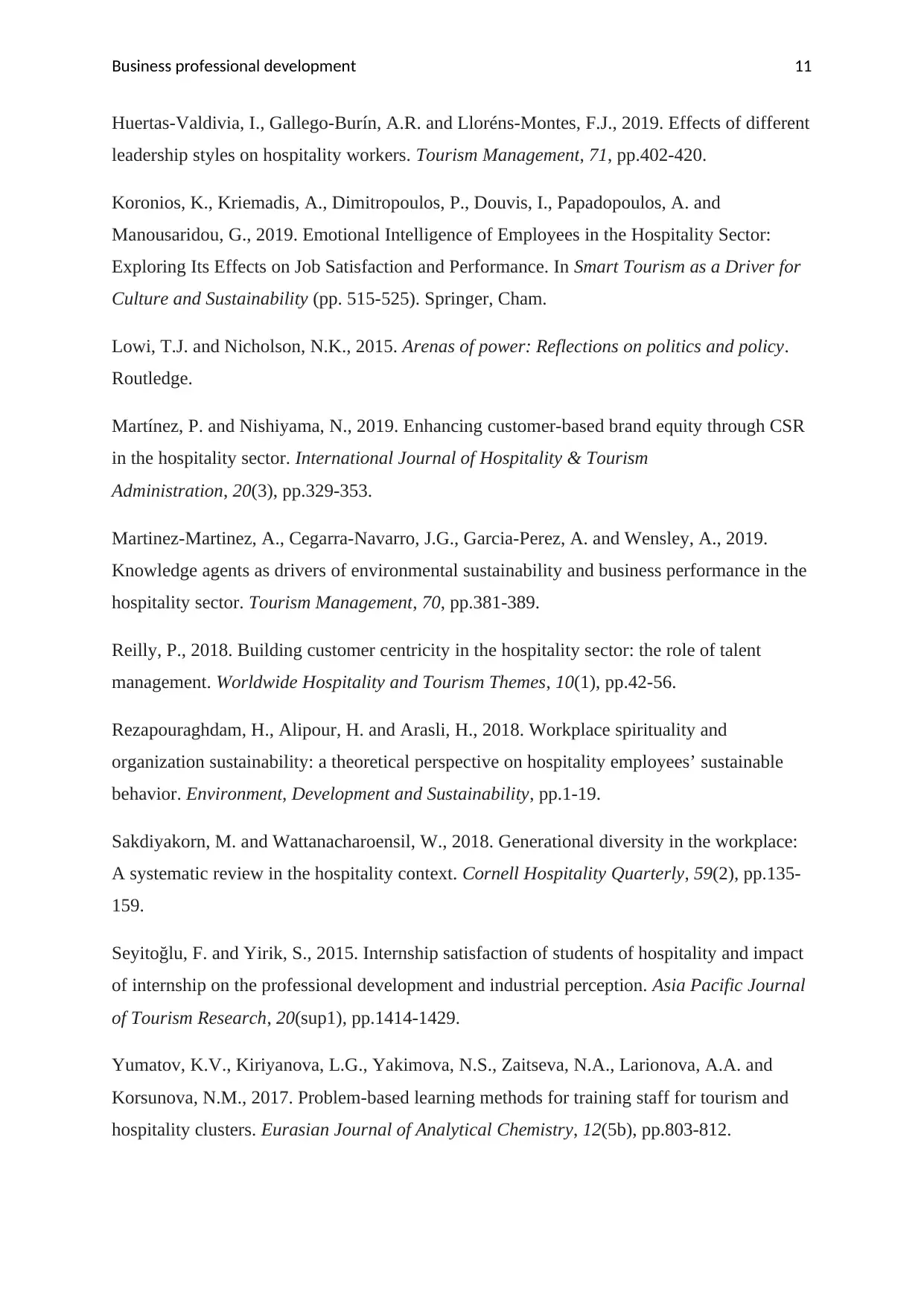
Business professional development 11
Huertas-Valdivia, I., Gallego-Burín, A.R. and Lloréns-Montes, F.J., 2019. Effects of different
leadership styles on hospitality workers. Tourism Management, 71, pp.402-420.
Koronios, K., Kriemadis, A., Dimitropoulos, P., Douvis, I., Papadopoulos, A. and
Manousaridou, G., 2019. Emotional Intelligence of Employees in the Hospitality Sector:
Exploring Its Effects on Job Satisfaction and Performance. In Smart Tourism as a Driver for
Culture and Sustainability (pp. 515-525). Springer, Cham.
Lowi, T.J. and Nicholson, N.K., 2015. Arenas of power: Reflections on politics and policy.
Routledge.
Martínez, P. and Nishiyama, N., 2019. Enhancing customer-based brand equity through CSR
in the hospitality sector. International Journal of Hospitality & Tourism
Administration, 20(3), pp.329-353.
Martinez-Martinez, A., Cegarra-Navarro, J.G., Garcia-Perez, A. and Wensley, A., 2019.
Knowledge agents as drivers of environmental sustainability and business performance in the
hospitality sector. Tourism Management, 70, pp.381-389.
Reilly, P., 2018. Building customer centricity in the hospitality sector: the role of talent
management. Worldwide Hospitality and Tourism Themes, 10(1), pp.42-56.
Rezapouraghdam, H., Alipour, H. and Arasli, H., 2018. Workplace spirituality and
organization sustainability: a theoretical perspective on hospitality employees’ sustainable
behavior. Environment, Development and Sustainability, pp.1-19.
Sakdiyakorn, M. and Wattanacharoensil, W., 2018. Generational diversity in the workplace:
A systematic review in the hospitality context. Cornell Hospitality Quarterly, 59(2), pp.135-
159.
Seyitoğlu, F. and Yirik, S., 2015. Internship satisfaction of students of hospitality and impact
of internship on the professional development and industrial perception. Asia Pacific Journal
of Tourism Research, 20(sup1), pp.1414-1429.
Yumatov, K.V., Kiriyanova, L.G., Yakimova, N.S., Zaitseva, N.A., Larionova, A.A. and
Korsunova, N.M., 2017. Problem-based learning methods for training staff for tourism and
hospitality clusters. Eurasian Journal of Analytical Chemistry, 12(5b), pp.803-812.
Huertas-Valdivia, I., Gallego-Burín, A.R. and Lloréns-Montes, F.J., 2019. Effects of different
leadership styles on hospitality workers. Tourism Management, 71, pp.402-420.
Koronios, K., Kriemadis, A., Dimitropoulos, P., Douvis, I., Papadopoulos, A. and
Manousaridou, G., 2019. Emotional Intelligence of Employees in the Hospitality Sector:
Exploring Its Effects on Job Satisfaction and Performance. In Smart Tourism as a Driver for
Culture and Sustainability (pp. 515-525). Springer, Cham.
Lowi, T.J. and Nicholson, N.K., 2015. Arenas of power: Reflections on politics and policy.
Routledge.
Martínez, P. and Nishiyama, N., 2019. Enhancing customer-based brand equity through CSR
in the hospitality sector. International Journal of Hospitality & Tourism
Administration, 20(3), pp.329-353.
Martinez-Martinez, A., Cegarra-Navarro, J.G., Garcia-Perez, A. and Wensley, A., 2019.
Knowledge agents as drivers of environmental sustainability and business performance in the
hospitality sector. Tourism Management, 70, pp.381-389.
Reilly, P., 2018. Building customer centricity in the hospitality sector: the role of talent
management. Worldwide Hospitality and Tourism Themes, 10(1), pp.42-56.
Rezapouraghdam, H., Alipour, H. and Arasli, H., 2018. Workplace spirituality and
organization sustainability: a theoretical perspective on hospitality employees’ sustainable
behavior. Environment, Development and Sustainability, pp.1-19.
Sakdiyakorn, M. and Wattanacharoensil, W., 2018. Generational diversity in the workplace:
A systematic review in the hospitality context. Cornell Hospitality Quarterly, 59(2), pp.135-
159.
Seyitoğlu, F. and Yirik, S., 2015. Internship satisfaction of students of hospitality and impact
of internship on the professional development and industrial perception. Asia Pacific Journal
of Tourism Research, 20(sup1), pp.1414-1429.
Yumatov, K.V., Kiriyanova, L.G., Yakimova, N.S., Zaitseva, N.A., Larionova, A.A. and
Korsunova, N.M., 2017. Problem-based learning methods for training staff for tourism and
hospitality clusters. Eurasian Journal of Analytical Chemistry, 12(5b), pp.803-812.
⊘ This is a preview!⊘
Do you want full access?
Subscribe today to unlock all pages.

Trusted by 1+ million students worldwide
1 out of 13
Related Documents
Your All-in-One AI-Powered Toolkit for Academic Success.
+13062052269
info@desklib.com
Available 24*7 on WhatsApp / Email
![[object Object]](/_next/static/media/star-bottom.7253800d.svg)
Unlock your academic potential
Copyright © 2020–2026 A2Z Services. All Rights Reserved. Developed and managed by ZUCOL.




